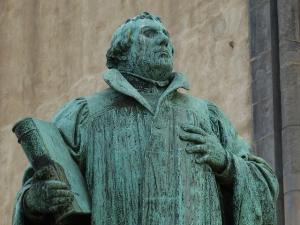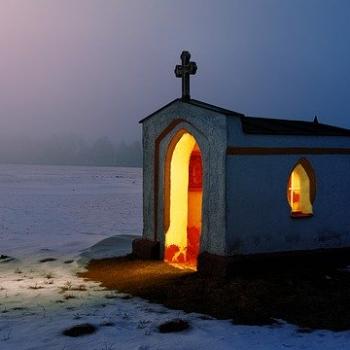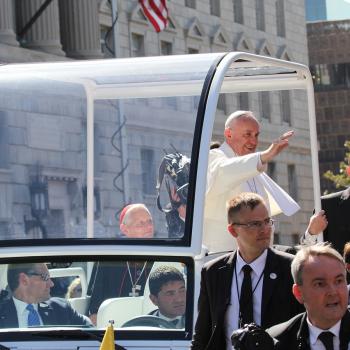 Isaiah Berlin once famously wrote that there are two kinds of thinkers. There are the foxes, who see history as reflecting a multiplicity of experiences and concepts that defies easy classification around a single theme, and there are the hedgehogs, who interpret history through the prism of a single fundamental idea. For better or worse, my sensibilities trend toward the hedgehog—and so I have a particular affection for massive doorstopper books that attempt to survey the complexity of intellectual history and organize the various strands around a coherent theme.
Isaiah Berlin once famously wrote that there are two kinds of thinkers. There are the foxes, who see history as reflecting a multiplicity of experiences and concepts that defies easy classification around a single theme, and there are the hedgehogs, who interpret history through the prism of a single fundamental idea. For better or worse, my sensibilities trend toward the hedgehog—and so I have a particular affection for massive doorstopper books that attempt to survey the complexity of intellectual history and organize the various strands around a coherent theme.
Notre Dame historian Brad Gregory’s 2012 volume, The Unintended Reformation: How a Religious Revolution Secularized Society, is such a doorstopper. And its argument is admirably audacious: the pathologies of modernity—from environmental devastation to value pluralism—are traceable back to the collapse of medieval Christendom and the triumph of the Reformation. Gregory demonstrates this—or, well, tries to—by way of reference to six interconnected domains: metaphysics, the authority of religious truth-claims, civil liberties, ethics, capitalism, and universities.
Let me say up front that I am not qualified to critique Gregory’s book on historical grounds—so I have no intention of summarizing the whole text or penning a formal review. And I freely admit that I’m approaching the text with confessional biases of my own (as a Lutheran, after all, I have a vested interest in not buying Gregory’s argument that the Reformation caused the collapse of a flourishing medieval Christian culture and the rise of contemporary secularity).
But I can at least evaluate whether Gregory’s argument succeeds on its own terms, and alas, I must report that this is not a “big book” that sticks the landing. My two biggest complaints with The Unintended Reformation can be summarized as 1) the problem of fragmentation, and 2) the problem of interpretation.
1) The Problem of Fragmentation
Though the argument never quite comes fully into view, it’s clear that what Gregory pines for is this: a universal and unifying source of authority, beyond individual will, that is capable of meaningfully adjudicating disputes—religious, political, ethical, what have you—and establishing a “final resolution.” (This discussion is heavily influenced, unsurprisingly, by Alasdair MacIntyre’s After Virtue.) In the same way that the Christian Church, for all intents and purposes, “finally resolved” the question of Jesus’s divinity vis-à-vis the Father, it should—on Gregory’s account—be possible to “finally resolve” a disputed moral question such as abortion, or impose various binding restrictions on practices associated with extractive capitalism. That source of absolute and final adjudicative authority, Gregory argues, was for centuries the Roman Church. And so, for Gregory, Protestant skepticism about Rome’s authority claims necessarily entails skepticism about the possibility of such actual resolution of disagreement.
As a point of political theory, Gregory perhaps has a point: the final resolution of any disputed question should properly, it seems, lie with the appointed Vicar of Christ (if one accepts that the Roman pontiff is indeed such a successor). But The Unintended Reformation is (supposed to be) doing history, not political philosophy—and in view of Christian history more broadly, treating the Reformation as the primary point of ecclesiastical fragmentation strikes me as an essentially arbitrary move.
Crucially, the Great Schism of 1054—which sundered the Catholic West from the Orthodox East—is barely discussed. But the fact of this separation—and the concomitant recognition that Christian unity could transcend a certain degree of institutional division was not lost on the Reformers themselves. As the Book of Concord’s Treatise on the Power and Primacy of the Pope clearly states, “[I]t is manifest that the kingdom of Christ is scattered throughout the whole world; and to-day there are many churches in the East which do not seek ordination or confirmation from the Roman bishop.” Gregory seems essentially unaware of the important Reformation-era distinction between the visible and invisible Church: on this model, challenging the authority claims of one visible church among others (Rome) is not, in any sense, tantamount to denying the universal authority of the single invisible Church within which all believers are united. That, after all, is the true “kingdom of Christ” encompassing Catholic, Lutheran, and Orthodox believers alike.
Gregory’s argument depends on the claim that the Reformation was the decisive Christian break from unitary Roman authority, which splintered the intellectual-theological consensus and led to the multiplicity of truth-claims inherent to modernity. But first, the Reformation wasn’ta break from church authority writ large—the Formula of Concord describes the ecumenical creeds as “the true Christian doctrine, in a pure, sound sense”—and second, the broader concept of Christian unity across competing authority structures—with all the fragmentation that, on Gregory’s account, necessarily follows—did not originate with the Reformation. At the very least, something must be done to distinguish the “splintering” effect of the Schism from the effect of the Reformation if Gregory’s argument is to go forward, but no obvious answer presents itself.
2) The Problem of Interpretation
As Catholic writers are wont to do, Gregory roots the chief failing of Protestantism in the principle of sola Scriptura—which, to his mind, rendered “every man his own interpreter” and shattered the unity of Christendom into a multiplicity of different warring factions. Reams of scholarship have been written about the Reformers’ rejection of purely individuated interpretations of the text, so I won’t belabor that point here.
Rather, the most glaring weakness of The Unintended Reformation is its hand-wavy treatment of the possibility and direction of intra-Catholic disagreement. Just to give one example, when Pope Francis issued the controversial Amoris laetitia encyclical—which contained a footnote seemingly suggesting a relaxed approach to Communion for the divorced and remarried—“liberal” and “conservative” Catholics immediately understood the footnote in radically divergent ways, as Ross Douthat ably chronicled in To Change the Church: Pope Francis and the Future of Catholicism. This illustrates what, for Gregory, would surely be an uncomfortable point. Exchanging sola Scriptura for sola ecclesia does not solve the problem of private interpretation: a church tradition that allows for the “development of doctrine,” in John Henry Newman’s famous formulation, simply opens up more fronts for interpretive disagreement.
If unified interpretation of Scripture and final resolution of disputed questions is the standard by which the Catholic and Protestant traditions are compared, one can’t help thinking that both branches of Christianity have failed to clear that bar. Certainly a degree of interpretive ambiguity is unavoidable—it is impossible, after all, to approach any text apart from a certain set of tradition-informed presuppositions—but this means that “final resolution of disputed questions!” is not a cudgel that Catholic critics can properly wield against their Protestant interlocutors. (At least, not in view of the world that we all actually inhabit.)
That problem is foregrounded here because many of the problems of modernity that Gregory identifies are not, by any stretch of the imagination, products of the Reformation. The book’s first chapter, for instance, describes Duns Scotus’s doctrine of the univocity of being (the notion that God is not “wholly other,” but rather an entity among other entities) as a key factor in the development of antagonism between faith and science. Despite the Scotist doctrine’s sharp break from Thomas Aquinas’s analogical account of being, Gregory approvingly tells of Catholic universities that maintained chairs in both Thomist and Scotist thought. But if univocity (as Gregory argues) is a slippery slope to secularity, and the position emerged within a distinctly Catholic milieu, how is the Reformation to blame for this? Or, historically speaking, why wasn’t the simultaneous maintenance of Thomist and Scotist chairs in philosophy the real problem that laid the foundation for modernity?
This is a subject Gregory never tackles, perhaps because he dislikes the logical implications of his stance. It would seem that, in order to avoid fragmentation and pluralism, and an infinite range of private interpretation, the Church needed to be far more zealous at rooting out deviant doctrines than it ever was—an Inquisition on steroids, so to speak. But this, of course, is irreconcilable with Gregory’s rejection of a defensive-crouch approach to modernity on the Church’s part—and his rejection of “oppressive” religious policies more broadly.
* * *
I entered The Unintended Reformation expecting, as a Lutheran, to be disturbed. That did not happen: I set the book down feeling bemused, simply wishing Gregory had made a stronger argument. Perhaps this is the story of the West that certain Catholics like to tell themselves, but there are sufficient gaps in the account that its explanatory power is seriously questionable. Nor is it even the most effective presentation of its own challenges to modernity—almost every position advanced in the book’s core chapters has been argued more effectively elsewhere. Metaphysics? See John Milbank. Authority of religious truth-claims? Charles Taylor. Civil liberties? Patrick Deneen. Ethics? MacIntyre himself. Capitalism? Eugene McCarraher. Universities? MacIntyre again. And it’s not so much that these criticisms of modernity are wrong—I actually agree with most of them—as that these don’t have nearly as much to do with the Reformation as Gregory contends. They’re problems baked into the nature of human civilization and political philosophy writ large.
All that to say: unless you really enjoy having your preexisting sentiments confirmed, this is one “doorstopper” that is probably not worth the time investment.












